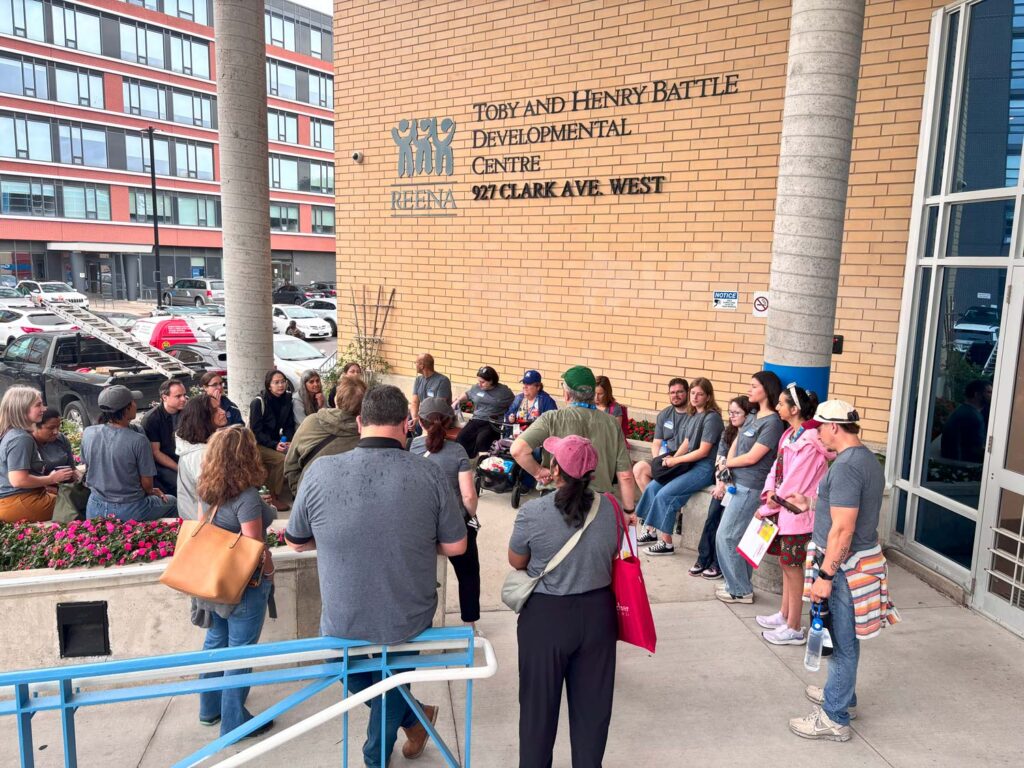On August 26th, ULI Toronto’s Accelerating Accessibility Coalition (AAC) teamed up with REENA to give members and guests a tour of the Lou Fruitman Residence in Thornhill. With over 50 attendees, the day was a success, providing numerous opportunities to reflect on the future of accessible housing. From developers to people with lived experience, and other disability organizations across the province, the room was filled with accessibility champions eager to create a Canadian housing market that leaves no one behind.
The event began with opening remarks from the AAC, followed by an introduction to REENA’s background and mission. With waitlists that can be up to 40 years for individuals with developmental disabilities to find appropriate housing, REENA decided to step in and take matters into their own hands. The Lou Fruitman property opened its doors in 2021 with 79 units, providing homes for approximately 138 adults with various disabilities.
“It was very important to us that the property was built beautifully,” shared Gary Gladstone, who led one of the group tours. “It was built the same way as if we were going to live here ourselves, or our parents were going to live here.”
The building opens to a modern lobby, with a receptionist area at the front, security on site and several respite suites that families can access throughout the year for shorter periods.
“While most of the units are for permanent housing, we do have a few units for respite. Families often care for their adult children with disabilities well into their senior years and can use a break sometimes. Unfortunately, there is not a lot of funding for respite, but people generally come stay for a weekend,” said Gary.
The units themselves are equipped with automatic doors, spacious openings, and shortly after stepping in, accessible kitchens can be seen, with sinks and stoves that can be wheeled under, and cabinets that can be adjusted to lower to sitting height.
Bedrooms are just as spacious, and many are equipped with hoyer lifts. Bathrooms come with ample space, feature roll-in showers with commode chairs, and even the toilet paper holders double as grab bars.
But beyond the physical accessibility of each unit, what stands out is the intentional creation of the Lou Fruitman Residence. In today’s world, amenity rooms in condos are often empty – but in the Lou Fruitman Residence, the music room is alive with song as 8-10 residents enjoy a day program and socialize with one another. Down the hall, there is a gym equipped with fully accessible equipment and an indoor track where residents can get exercise.
“It’s important that people have access to a gym at home. We have lots of residents with developmental disabilities and exercise opportunities are crucial for them,” shared Gary.
The residence is also equipped with a large kitchen in the basement, that people can use. “When someone moves in, they may not yet be comfortable with navigating a stove, an oven…this gives them an opportunity to practice cooking. Sometimes, we have guest chefs come in and help people learn to make their favourite meals,” he said.
On the top floor, there is a party room, complete with an outdoor terrace that is spacious and sunny, and just to the back of the building, is a garden, home to various herbs and vegetables that the residents care for themselves.
“It gives people a sense of pride that they are growing their own food and can then bring it to their kitchens and eat it. We also sell our produce to local grocery stores,” our tour guide said.
At reception, a resident works at the front desk and optimistically greets passersby. “I’ve been working here for two years now,” she shares, “I like it because it gives me something to do that I enjoy and I am paid well.”
What stood out even more is the integration of community services, all under one roof. Residents have varying needs depending on the types of disabilities they have, and therefore, use different services for PSW bookings and more.
“We have their administrative offices on site too, and they all work together under one roof,” shared Gary. “The great thing about this setup is that they all work together and are happy to support each other’s clients and step in where needed.”
Attendees of the tour were inspired by what they saw – from happy residents, to numerous useful amenities, to PSWs on site, REENA has taken accessible housing beyond building codes and created an exemplary model for housing in Canada.
SCIO is part of the Accelerating Accessibility Coalition’s Events and Programming Committee and took part in the planning and execution of this tour. The award-winning coalition combines experts from the development industry, real estate professionals, researchers and people with lived experience. Together, our mission is to create more accessible housing across Canada that goes beyond the building code and takes the growing and evolving needs of the Canadian population into account so they can thrive and lead fulfilling lives. Organizations and individuals who are interested in joining the Coalition can write to linda.weichel@uli.org


